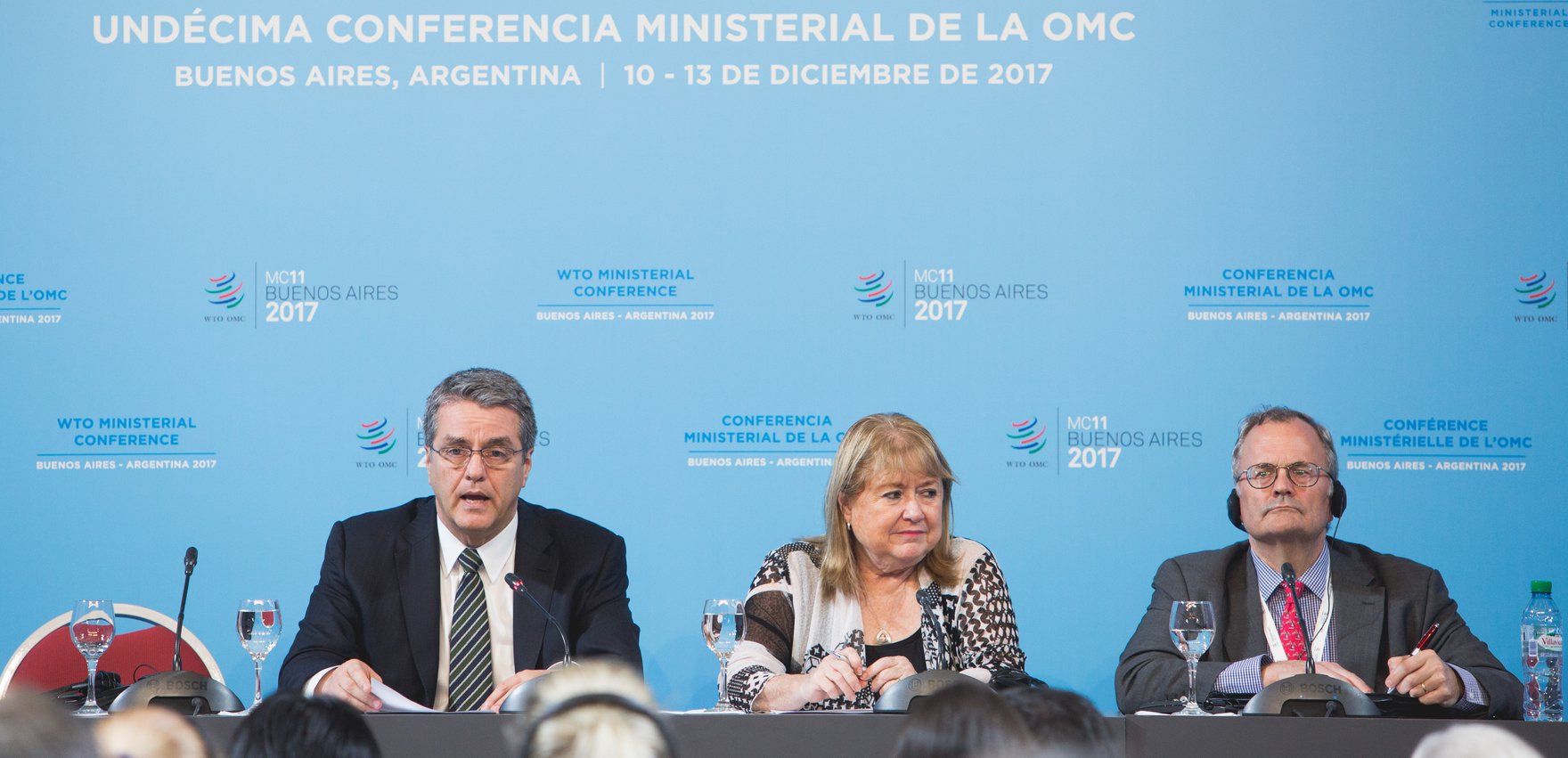The Declaration on Trade and Women’s Economic Empowerment was adopted at the World Trade Organization (WTO) ministerial meeting in Buenos Aires in December 2017. While the declaration attracted support from a majority of WTO member countries, several were disinclined to support it, with India stating that the WTO was not the right forum to discuss gender issues. Civil society groups have greeted the declaration with skepticism, labeling it a “pink herring” for distracting from the harm that WTO rules and policies cause women, or a “trojan horse” for trying to sneak in issues like public procurement under the garb of gender analysis. These concerns are largely correct, and the attempt to link gender with trade appears neither able to infuse life into WTO-led trade talks, nor tangibly address the negative impacts on women due to trade and economic policies.
The declaration itself is textually innocuous enough. It calls for collaboration to make trade and development policies more gender responsive through sharing of experiences and best practices, including through the WTO policy review process, more gender-disaggregated data and indicators, a focus on the impact of trade policies, a need to work together in the WTO and direct Aid for Trade to implement gender-sensitive trade policies.
There is nothing radical or new about any of these calls.
Indeed, this is the first time that such calls have emanated from the decision of a multilateral trade organization such as the WTO. But countries should already be collecting gender-disaggregated data and doing gender-impact analysis of all their policies — trade included — as they are required to do so under applicable international law, including the United Nations Convention on the Elimination of all Forms of Discrimination Against Women, or under Sustainable Development Goal 5.
Concerns arise when the declaration veers off to list topics on which the WTO will organize “seminars” to discuss trade and economic empowerment of women. The mere attempt to use seminars as a way to bring gender issues into trade has raised hackles. Recalling that the Singapore issues, including government procurement, were introduced through an EU-sponsored “study group” and subsequently dropped after running into headwind, it seems that those concerns are not misplaced.
Oddly enough, there is nothing in the declaration about gender and the informal economy, given the latter’s overwhelming feminization of labour, or about the negative gender impacts of trade and financial policies themselves. The assumption here seems to be that trade is gender neutral or even equality enhancing — a blind belief not based on facts, which has been well articulated by feminist and other scholarship.
Instead, the suggested topics read like a wish list for reviving the moribund post-Doha round of talks, with a focus on public procurement, financial inclusion, and the role of small and medium-sized businesses in value chains — all purportedly for gender parity. Naturally, there are concerns about why the issues that failed to gain traction in the WTO talks before — like government procurement — are singled out in a declaration on gender and trade. The failure to call attention to any of the negative aspects of WTO policies, the lack of women’s representation in the WTO mechanisms themselves or the biased nature of international legal norms that underpin them is telling.
Is there a need to ensure that trade and development policies are gender neutral or equality enhancing? Yes, but these are two rather different goals. Is the WTO the right forum, and is the declaration the right way to achieve these goals? Unlikely. Linking trade and gender is not controversial and is, in fact, necessary. The problem arises, as with any linkage argument in trade, such as trade and labour, with the lopsidedness of the field. Trade rules are robust and backed by strong enforcement mechanisms. Non-trade concerns such as labour, even when they are part of a trade agreement, as in the Comprehensive and Progressive Agreement for Trans-Pacific Partnership, are explicitly designed to be paper tigers.
Gender concerns are unlikely to be any different. This is particularly so when the trade delegations and WTO mechanisms, including the dispute-settlement body, remain staffed mostly by men. The rules of international law — which apply to trade disputes — draw on conservative interpretive principles that make it very difficult to treat trade rules as part of a whole system of international law. This includes rules on gender equality, rather than a hermetically sealed domain devoid of connection to the real world.
The trade policy review mechanism at the WTO remains capable of catering only to the interests of a handful of powerful countries, given their power, size and influence, as well as the capacity of delegations to engage in trade talks. Smaller countries, including least-developed countries, remain unable to engage meaningfully in this process. This situation has been exacerbated by the increasing prominence of bilateral and regional trade deals dominated by hegemons, which favour large countries over smaller ones.
Non-trade concerns such as gender or labour are capable of giving a voice to women in small countries, but remain a mirage.
Gender inequality is systemic and requires a comprehensive approach to legal and social reform, which must include a reform of neoliberal economic and trade policies that harm women. These policies require a reform of international law in general, including arcane areas of law such as treaty interpretation and sources. They also require an increase in the role of women in trade delegations, WTO staff and mechanisms. These overhauls can then be backed by the sort of measures the declaration promises — gender-impact tools and analyses, disaggregated data and indicators — but without a structural reform of economic, social and cultural domains, the declaration remains more of a pink herring than a historic advance.
